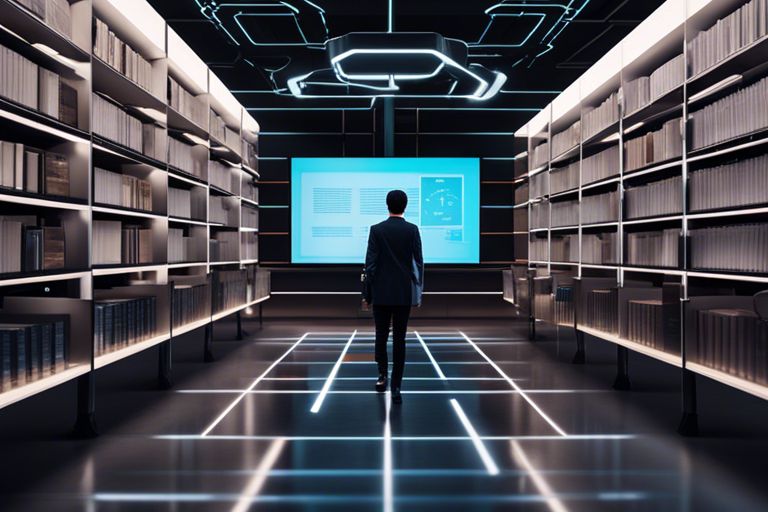Over the past few years, AI has been revolutionizing the way we learn and comprehend information. From personalized learning experiences to advanced data analysis, AI is transforming the educational landscape in remarkable ways. By leveraging machine learning algorithms and natural language processing, AI can adapt to individual learning styles and provide targeted feedback, ultimately improving student outcomes. Let’s examine into the ways AI is reshaping the future of education.
The Current State of Learning
While traditional teaching methods have been the cornerstone of education for centuries, they come with their own set of limitations when it comes to engaging students and catering to individual learning needs.
Limitations of Traditional Teaching Methods
To truly enhance learning and comprehension, it’s crucial to address the limitations of traditional teaching methods. One major drawback is the one-size-fits-all approach, where teachers deliver the same material to all students regardless of their unique learning styles and paces. This can lead to disengagement, frustration, and hindered comprehension for many learners.
The Rise of Digital Learning Platforms
An exciting development in education is the rise of digital learning platforms, which have the potential to revolutionize the way students learn and educators teach. These platforms leverage technology to provide personalized learning experiences, interactive content, and immediate feedback to students.
For instance, AI-powered digital learning platforms can analyze a student’s learning patterns and adapt the material to suit their individual needs. This customized approach not only keeps students more engaged but also improves comprehension as they can learn at their own pace.
The Potential of AI in Education
Even in traditional educational settings, the one-size-fits-all approach might not always cater to every student’s specific learning needs. This is where AI can revolutionize education by offering personalized learning experiences. By analyzing the performance and preferences of individual students, AI algorithms can tailor educational materials to suit their unique learning styles. This customization can enhance comprehension and retention rates significantly, as students engage more effectively with the learning material when it is presented in a way that resonates with them.
Personalized Learning Experiences
Personalized learning experiences are a game-changer in education as they cater to the individual needs of each student. AI can track a student’s progress, identify areas where they need help, and provide additional resources or exercises to strengthen their understanding. This tailored approach ensures that students receive the support they need precisely when they need it, leading to better academic outcomes and a deeper comprehension of the subject matter.
Intelligent Tutoring Systems
Education is transformed through the implementation of Intelligent Tutoring Systems, where AI serves as a virtual tutor, guiding students through their learning journey. These systems can adapt in real-time to student responses, providing immediate feedback and explanations to help clarify concepts. The AI tutors can also adjust the pace of learning based on the student’s grasp of the material, ensuring they neither fall behind nor feel overwhelmed.
Enhancing Learning Outcomes
There’s no doubt that AI technology is revolutionizing the way we approach learning and comprehension. By utilizing AI in educational settings, we can enhance learning outcomes and ensure that each student receives personalized assistance and feedback tailored to their needs.
Adaptive Assessments and Feedback
An adaptive assessment and feedback system powered by AI can provide students with personalized learning experiences. AI algorithms analyze student responses in real-time, identifying areas of strength and weakness. This allows educators to tailor their instruction to individual student needs, ultimately improving learning outcomes.
Real-time Performance Analytics
An AI-driven real-time performance analytics system can provide educators with invaluable insights into student progress. By analyzing data on student performance instantly, teachers can identify struggling students early on and provide timely interventions to support their learning. This proactive approach can lead to improved academic outcomes and a more engaging classroom environment.
To further enhance student learning, educators can leverage real-time performance analytics to identify trends and patterns in student performance. By utilizing this data-driven approach, teachers can make informed decisions about their instructional strategies and ensure that each student is receiving the support they need to succeed.
Improving Comprehension through AI
Once again, Artificial Intelligence (AI) proves its value in education by significantly enhancing students’ comprehension levels. By incorporating AI-driven tools and techniques, educators can revolutionize the way information is presented and absorbed, leading to more effective learning outcomes.
Natural Language Processing and Text Analysis
Improving comprehension through Natural Language Processing (NLP) and text analysis allows AI to break down complex information into digestible chunks. This technology can identify key concepts, summarize content, and generate interactive study materials tailored to each student’s needs. By analyzing text in real-time, AI can provide immediate feedback and personalized learning recommendations, boosting comprehension and retention.
Visual Learning Aids and Interactive Simulations
To engage students on a deeper level, AI utilizes visual learning aids and interactive simulations to create immersive learning experiences. These tools help students visualize abstract concepts, interact with information in a hands-on manner, and better understand complex relationships. By incorporating gamification elements, AI makes learning enjoyable and encourages active participation in the educational process.
AI-driven Content Creation
Keep up with the technological advancements in the educational sector by leveraging AI-driven content creation. This innovative approach can revolutionize the way educational materials are developed and delivered, ultimately enhancing learning and comprehension for students.
Automated Lesson Planning and Curriculum Development
AIdriven tools can assist educators in streamlining the lesson planning process and developing comprehensive curricula tailored to the specific needs of students. By analyzing vast amounts of data and educational resources, AI algorithms can recommend personalized learning paths, resources, and activities to enhance student engagement and understanding.
Intelligent Grading and Evaluation Systems
AIdriven intelligent grading systems can efficiently evaluate students’ performance on assignments and assessments, providing instant feedback to both students and teachers. These systems can identify patterns in student performance, offer personalized recommendations for improvement, and reduce the burden of manual grading for educators.
Moreover, with AI-based evaluation systems, educators can gain valuable insights into student progress and identify areas where additional support or resources may be needed to enhance learning outcomes.

The Role of AI in Special Education
Supporting Students with Disabilities
For special education students, AI can play a crucial role in providing personalized learning experiences. AI algorithms can analyze the unique learning styles and capabilities of students with disabilities, creating tailored lesson plans and activities to maximize their educational growth.
Customized Learning Paths for Diverse Needs
Special education often requires individualized attention to cater to diverse needs. With AI technology, educators can create customized learning paths for each student, adjusting the pace and content of lessons to ensure optimal understanding and retention.
With AI-powered platforms, students with disabilities can benefit from interactive tools that adapt to their progress and provide real-time feedback. This personalized approach can empower special education students to overcome challenges and unlock their full potential.
Teacher-AI Collaboration
Not only can AI enhance learning and comprehension for students, but it can also greatly benefit teachers through collaboration. AI technology can assist educators in various aspects of their work, helping to streamline processes and improve outcomes.
AI-assisted Lesson Planning and Delivery
On the forefront of teacher-AI collaboration is AI-assisted lesson planning and delivery. By analyzing data on student performance and learning styles, AI can suggest personalized strategies for lesson plans. It can also provide real-time feedback during lessons, helping teachers make adjustments on the spot to ensure optimal comprehension.
Professional Development Opportunities for Educators
On another note, AI opens up new opportunities for professional development for educators. Through AI-powered platforms, teachers can access personalized training programs tailored to their specific needs and goals. This individualized approach can help educators enhance their skills and stay up-to-date with the latest teaching methodologies.
An necessary aspect of professional development through AI is the ability to track progress and assess the effectiveness of training programs. By analyzing data on teacher performance and student outcomes, AI can provide valuable insights to educators and education institutions, ultimately leading to continuous improvement in teaching practices.
Addressing Concerns and Challenges
Ensuring AI Bias and Fairness in Education
Challenges arise when integrating AI into education systems due to the inherent biases present in data. AI algorithms can perpetuate societal biases and inadvertently discriminate against certain groups of students. To address this issue, it is crucial for developers to incorporate fairness and transparency into AI systems used for educational purposes.
Developers and educators must work together to continuously monitor and evaluate AI systems for any biased outcomes. Implementing diverse datasets and regular audits can help mitigate bias and ensure that AI technologies enhance learning experiences for all students.
Data Privacy and Security in AI-driven Learning
The rapid adoption of AI in education raises concerns about data privacy and security. As schools and institutions collect vast amounts of student data, there is a heightened risk of unauthorized access and misuse.
The implementation of robust data protection measures and strict privacy policies is crucial to safeguard student information. Educators should prioritize transparent communication with students and parents about how their data is being used to build trust and ensure compliance with privacy regulations.
The Future of AI in Education
Many experts believe that the future of AI in education is bright, with endless possibilities for enhancing learning and comprehension. As technology continues to advance, AI is expected to play a more significant role in shaping the way students learn and teachers instruct. From personalized learning experiences to real-time feedback and assessment, AI has the potential to revolutionize the education sector.
Emerging Trends and Innovations
With the rapid development of AI technologies such as natural language processing, machine learning, and predictive analytics, we can expect to see more tailored and adaptive learning solutions. These innovations will enable educators to better understand students’ individual needs and provide targeted support, ultimately improving learning outcomes. Additionally, virtual reality and augmented reality technologies are poised to transform the traditional classroom experience, making learning more engaging and interactive.
Predictions and Projections for Widespread Adoption
An increase in accessibility and affordability of AI tools is expected to drive widespread adoption in educational institutions globally. With AI’s ability to automate administrative tasks, personalize learning, and provide valuable insights, schools and universities are likely to integrate AI solutions into their day-to-day operations. Projections show that AI adoption in education could lead to more efficient teaching practices, higher student achievement, and a more inclusive learning environment.
Real-world Applications and Success Stories
Implementing AI in K-12 Education
Your journey into AI-enhanced learning begins with understanding how it can revolutionize K-12 education. Whether it’s personalized learning paths for each student, automated grading systems, or even virtual tutors, the potential for AI to transform the traditional classroom experience is immense. By analyzing vast amounts of data and adapting to the unique needs of each learner, AI can significantly improve student outcomes and enhance overall comprehension.
AI-enhanced Corporate Training and Professional Development
Development in the professional realm has also seen a surge in the integration of AI technologies to enhance training programs and support ongoing professional development. By providing personalized learning experiences tailored to individual employee needs, AI can dramatically increase engagement and knowledge retention within corporate settings. Organizations that have embraced AI-enhanced training have reported increased productivity and employee satisfaction, showcasing the tangible benefits of incorporating AI into professional development initiatives.
Professional development is a vital component in upskilling and reskilling the workforce to meet the demands of an ever-evolving job market. By leveraging AI-powered tools such as virtual reality simulations and adaptive learning platforms, organizations can ensure that their employees are equipped with the necessary skills to excel in their roles and drive business growth. With AI as a supportive partner in professional development, the possibilities for continuous learning and improvement are endless.
Overcoming Implementation Barriers
Infrastructure and Resource Constraints
Barriers to implementing AI in education often stem from infrastructure and resource constraints. Many schools lack the necessary technology and technical support to effectively integrate AI tools into their curriculum. Without adequate hardware, software, and internet connectivity, leveraging AI for learning and comprehension becomes a challenge.
Change Management and Teacher Buy-in
An necessary aspect of implementing AI in education is navigating change management and garnering teacher buy-in. Teachers are central to the success of integrating AI tools in the classroom. However, many educators may be resistant to change or feel overwhelmed by the introduction of new technology. Overcoming these barriers requires proactive communication, training, and support to help teachers embrace AI as a valuable educational resource.
It is crucial for educational leaders to involve teachers in the decision-making process when implementing AI initiatives. By providing teachers with opportunities for professional development and demonstrating the benefits of AI in enhancing student learning outcomes, administrators can foster a culture of innovation and collaboration in schools.
The Human Touch in AI-enhanced Learning
Now, as artificial intelligence continues to revolutionize the way we learn and comprehend information, it is crucial to consider the role of the human touch in this tech-driven education landscape. While AI algorithms can efficiently deliver personalized learning experiences and feedback, they may lack the emotional intelligence and empathy that human teachers naturally possess.
Preserving Emotional Intelligence and Empathy
On the journey to enhance learning with AI, it is vital to preserve the emotional intelligence and empathy that human instructors bring to the table. These qualities are important for creating a supportive and nurturing learning environment, where students feel understood, valued, and motivated to excel.
Fostering Creativity and Critical Thinking
An important aspect of learning that benefits from the human touch is fostering creativity and critical thinking. While AI can provide information and guide students through structured learning paths, it may struggle to inspire innovative thinking and problem-solving skills. Human educators excel in encouraging students to think outside the box, ask challenging questions, and explore new ideas.
Empathy plays a crucial role in this process, as teachers can understand each student’s unique learning style and challenges, adapting their approach to support individual growth. By integrating AI tools with human teaching methods, we can create a synergistic educational experience that combines the efficiency of technology with the depth of human connection.
Evaluating the Effectiveness of AI in Education
Despite the growing interest in using AI in education, it is crucial to evaluate its effectiveness to ensure that the technology is enhancing learning outcomes. Researchers are employing various research methods and metrics to assess the impact of AI in education.
Research Methods and Metrics for Assessment
Evaluating the effectiveness of AI in education requires rigorous research methods and the use of appropriate metrics. Studies may involve comparing the performance of students using AI-powered learning tools with those using traditional methods. Metrics such as academic achievement, engagement levels, and retention rates can provide insights into the impact of AI on student learning.
Long-term Impact and ROI Analysis
The long-term impact of AI in education goes beyond immediate results and involves analyzing the Return on Investment (ROI) of implementing AI technologies in educational settings. This analysis considers factors such as the cost of AI implementation, improvements in student performance, and the overall benefit to the education system.
Effectiveness of AI in education can be measured not only by immediate improvements in learning outcomes but also by its long-term impact on student success and the educational system as a whole. It is necessary to consider the potential benefits and risks associated with integrating AI into educational practices to make informed decisions about its use.
Summing up
Hence, AI stands as a powerful ally in revolutionizing the way we learn and comprehend information. By utilizing AI’s capabilities in personalization, adaptive learning, and instant feedback, learners can experience a more tailored and effective educational journey. With the potential to enhance retention rates and provide a deeper understanding of complex topics, AI is poised to transform the landscape of education and empower individuals to reach new heights of knowledge and comprehension.
FAQ
Q: What is AI?
A: AI, or Artificial Intelligence, refers to the simulation of human intelligence processes by machines, especially computer systems.
Q: How can AI enhance learning and comprehension?
A: AI can enhance learning and comprehension through personalized learning experiences, adaptive learning systems, and data-driven insights to identify areas of improvement.
Q: What are some examples of AI applications in education?
A: AI applications in education include intelligent tutoring systems, language processing tools for feedback on writing assignments, and virtual reality simulations for hands-on learning experiences.
Q: How does AI enable personalized learning experiences?
A: AI can analyze individual learning patterns and preferences to create customized learning paths, recommend resources, and provide targeted feedback to students.
Q: Can AI help in grading and assessment processes?
A: Yes, AI can automate grading processes for multiple-choice questions, essays, and even complex problems by analyzing patterns and criteria set by educators.
Q: How does AI improve teacher efficiency?
A: AI tools can automate administrative tasks, provide real-time analytics on student performance, and assist in creating personalized learning materials, allowing teachers to focus more on teaching and mentoring.
Q: Is AI likely to replace human teachers in the future?
A: While AI can augment teaching practices and improve learning outcomes, the role of human teachers in providing emotional support, creativity, and critical thinking skills is irreplaceable, making collaboration between AI and teachers the most effective approach.




